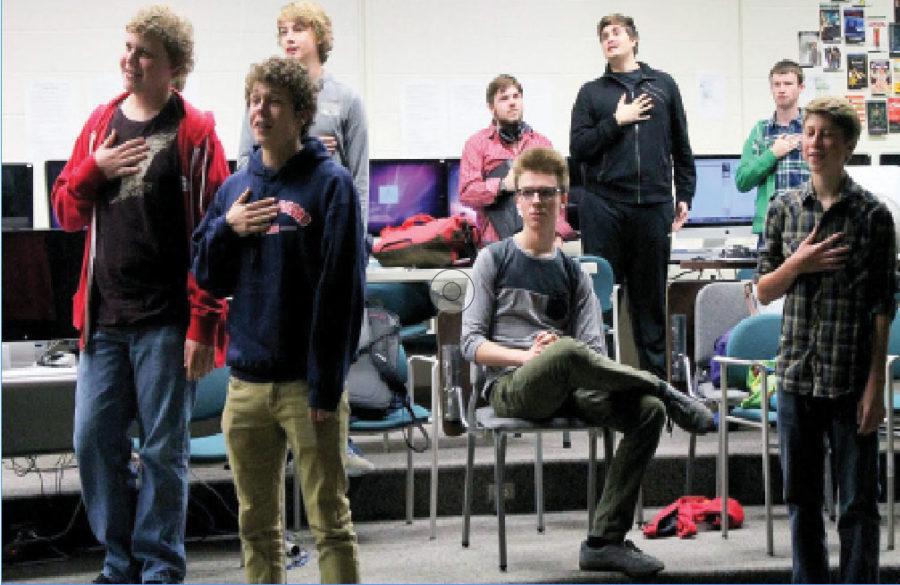The Pledge of Allegiance came under fire early last September as an unidentified Massachusetts family of atheist affiliation challenged the pledge in the Massachusetts Supreme Court. They felt the inclusion of the phrase “under God” discriminated against their child. This court case, (Doe v. Acton-Boxborough Regional School District), presents courts with a new reason for challenging the pledge, as all other challenges have claimed that it was a violation of the constitutional separation of church and state.
Students at this school demonstrate mixed opinions and feelings regarding the recitation of the pledge.

Senior Lucas Crum is among those who said they feel students should not be pressured or required to recite the pledge.
Crum said, “I personally don’t agree with some of the things the pledge says, and I don’t think I should have to stand for it if I don’t agree.”
He said he specifically took issue with the phrase “under God,” the very same portion of the pledge being challenged in the Massachusetts court case.
Crum recounted one instance in which he abstained from the recitation of the Pledge of Allegiance. His SRT happened to have a substitute teacher in for the day. Crum characterized the atmosphere in the room as “very hectic.” Students talked during the pledge; some stood and remained silent, but Crum elected simply to sit quietly. After the students had resumed their seats, the substitute SRT teacher confronted him.
“She asked me if I was privileged in some way. She insinuated that somehow you would need special permission to sit for the pledge.” Crum said. “I assumed it was my constitutional right.”
As of the 1943 Supreme Court decision in the West Virginia v. Barnette case, no one in the United States is required to say the pledge. For this reason, it is possible that courts will not deem the pledge discriminatory to any group of students.
According to social studies teacher Joe Stuelpe, “Legal precedent has upheld the inclusion of that phrase… because participation is optional; even with the changes they may still follow precedent.”
In addition, the pledge is widely favored in the United States. A Sept. 3 poll conducted by Rasmussen Reports showed that some 68 percent of adult Americans think schools should require students to say the pledge every morning.
Social studies teacher Karen Taff explained why she personally felt the pledge is an important practice.
“For me the pledge is a personal exercise, which I would hope it would be for everyone and not some mindless ritual,” she said.
For her part, Taff said she regularly recites the Pledge of Allegiance chiefly out of respect and patriotism.
“I knew people who fought and died for this country. I know people who are fighting in uniform today…So for me personally, it’s a reminder. When I say the pledge, I always think about those folks, some of them students, who are currently in uniform and in harm’s way.”

































![AI in films like "The Brutalist" is convenient, but shouldn’t take priority [opinion]](https://hilite.org/wp-content/uploads/2025/02/catherine-cover-1200x471.jpg)









































![Review: “The Immortal Soul Salvage Yard:” A criminally underrated poetry collection [MUSE]](https://hilite.org/wp-content/uploads/2025/03/71cju6TvqmL._AC_UF10001000_QL80_.jpg)
![Review: "Dog Man" is Unapologetically Chaotic [MUSE]](https://hilite.org/wp-content/uploads/2025/03/dogman-1200x700.jpg)
![Review: "Ne Zha 2": The WeChat family reunion I didn’t know I needed [MUSE]](https://hilite.org/wp-content/uploads/2025/03/unnamed-4.png)
![Review in Print: Maripaz Villar brings a delightfully unique style to the world of WEBTOON [MUSE]](https://hilite.org/wp-content/uploads/2023/12/maripazcover-1200x960.jpg)
![Review: “The Sword of Kaigen” is a masterpiece [MUSE]](https://hilite.org/wp-content/uploads/2023/11/Screenshot-2023-11-26-201051.png)
![Review: Gateron Oil Kings, great linear switches, okay price [MUSE]](https://hilite.org/wp-content/uploads/2023/11/Screenshot-2023-11-26-200553.png)
![Review: “A Haunting in Venice” is a significant improvement from other Agatha Christie adaptations [MUSE]](https://hilite.org/wp-content/uploads/2023/11/e7ee2938a6d422669771bce6d8088521.jpg)
![Review: A Thanksgiving story from elementary school, still just as interesting [MUSE]](https://hilite.org/wp-content/uploads/2023/11/Screenshot-2023-11-26-195514-987x1200.png)
![Review: "When I Fly Towards You", cute, uplifting youth drama [MUSE]](https://hilite.org/wp-content/uploads/2023/09/When-I-Fly-Towards-You-Chinese-drama.png)
![Postcards from Muse: Hawaii Travel Diary [MUSE]](https://hilite.org/wp-content/uploads/2023/09/My-project-1-1200x1200.jpg)
![Review: "Ladybug & Cat Noir: The Movie," departure from original show [MUSE]](https://hilite.org/wp-content/uploads/2023/09/Ladybug__Cat_Noir_-_The_Movie_poster.jpg)
![Review in Print: "Hidden Love" is the cute, uplifting drama everyone needs [MUSE]](https://hilite.org/wp-content/uploads/2023/09/hiddenlovecover-e1693597208225-1030x1200.png)
![Review in Print: "Heartstopper" is the heartwarming queer romance we all need [MUSE]](https://hilite.org/wp-content/uploads/2023/08/museheartstoppercover-1200x654.png)




